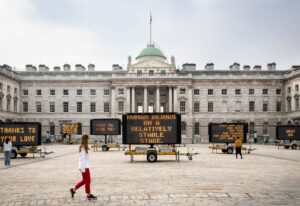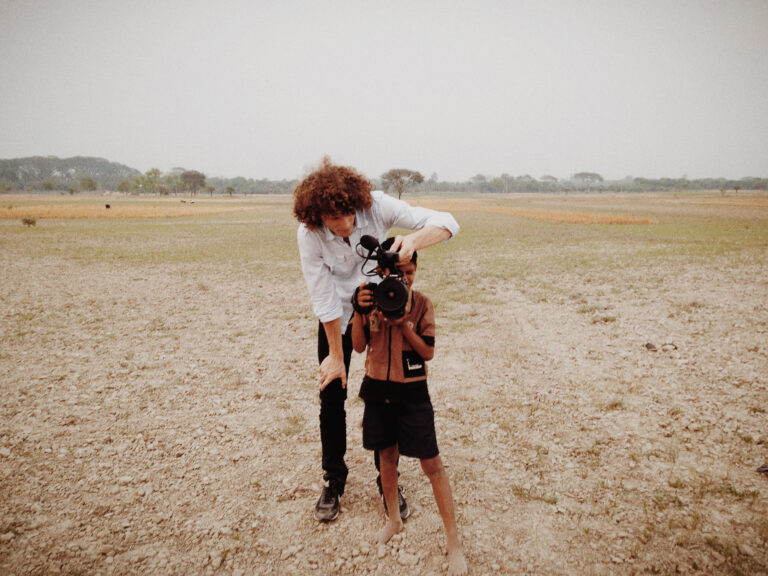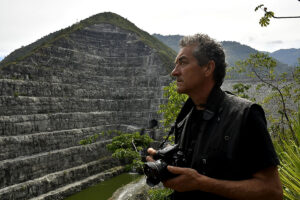
Justin Brice – Environmental Artist
Environmental artist Justin Brice encourages others to take a critical look at the relationship between humans and the planet.
USA
Madison Hagen May 21, 2021
As an award-winning filmmaker, Andrew Morgan centers his artistic vision around the nuance at the heart of various global predicaments. In revealing complex perspectives with empathy and precision, Morgan has gained international acclaim for his documentaries, all of which offer intimate insight into loss, survival, and joy. His most recognized film, The True Cost, explores the environmental as well as the social impact of the fashion industry, highlighting the perspectives of historically marginalized communities and the exploitation that the fashion industry so often perpetuates.
Featured on HBO, Netflix, Hulu, and Amazon Prime Video, Morgan’s work combines a rare faculty for connectivity. Inviting us to not only consider but to embrace humanity at its fullest expression, film allows us to forge new communities that catalyze understanding, empathy, and reflection through shared storytelling. Insightful, provocative, and empowering, Morgan’s films consistently succeed in leaving us with something to think about.
MoL: Where are you from?
AM: Atlanta, Georgia.
MoL: Where did you go to school and what did you study?
AM: I moved out to LA after high school and attended The Los Angeles Film School, where I studied cinematography.
MoL: How did you begin your career in the filmmaking industry? What was your first job?
AM: After school I began working all kinds of jobs from pulling cable to camera operating – learning as much as I could from some really talented people I was lucky enough to work with. Around the same time, I started directing short films and eventually documentaries before writing and directing scripted features as well.
MoL: Who or what inspired you to become a filmmaker?
AM: Growing up, I sat on the end of my bed one night watching E.T. I cried my eyes out as the film ended and was absolutely transfixed by the power of this mysterious medium to enable me to feel such deep emotions and empathy. That week, I started making short films in the backyard and began a lifelong fascination with the art and craft of storytelling.
MoL: What sparked your passion to make films that address the critical issues of our time?
AM: My dad died in a cycling accident that I witnessed. The experience left me absolutely overwhelmed with grief, fear, and trauma. I felt totally unprepared and needed to find a way back to my life without losing myself in the process. I decided to make a documentary about loss, to learn from people all over the country who had been on this unique journey, and the experience was transformative for me. It also left me so moved by the power of this style of personal storytelling as a tool of real hope and healing that lead very directly to several of the films that I’ve made since then.
MoL: Where do you draw most of your inspiration for your films? What is your creative process from concept to finished product?
AM: Usually something reaches out and grips me, grabs my heart, making it impossible to ignore. It takes a lot of energy and effort to make a film, so it has to start with real curiosity – something I’m searching for – and be fascinating enough to hold my attention all the way through the process. I also find people really interesting, both the subjects or actors as well as the brilliant team of storytellers I get to work with everyday.
MoL: Your critically acclaimed film, The True Cost, explores the impact of fashion on people and the planet. What inspired you to make this film? Who did you interview and why? How has this film influenced positive change in the fashion industry?
AM: I saw a newspaper headline one morning about a factory that had collapsed outside Dhaka, Bangladesh, taking the lives of more than a thousand workers. I picked up the paper and read about how these workers, mostly women, were working to make clothes for major western brands. All at once, I realized I had never actually stopped to think about where my clothes actually came from. That question led me and a small team of us around the world over the next couple years in an experience that changed me forever. The film became a global catalyst for change and a tool in the hands of activists and organizers fighting for a more just and sustainable future for fashion.
MoL: Once you have finished your films, do you stay in contact with the people you have interviewed? Do you continue to collaborate with these people and support their causes?
AM: Yeah, I really do. They have become dear friends to me now across this country and all over the world. We are actually about to release a new short documentary following up on ideas from The True Cost, as it relates to workers’ wages in garment producing countries. It was so fun to reconnect with some of the same fixers, journalists, and activists who continue to inspire me everyday.
Mol: What is the most important thing that you would you like viewers to take away from your films?
AM: Empathy. I think it’s a sacred human practice – this idea of imagining life in someone else’s shoes. My own lived experiences are so small, but through film we are all able to live outside ourselves, and it has the capacity to soften us and open us up in all the best ways. That’s how movies have changed my life over the years, and it’s what I am trying to create for someone every time I start to work on something new.
MoL: Do you lead an eco-conscious life and if so, how? How do you balance life as a traveling filmmaker with your personal life?

AM: I’m always trying to improve, working hard to take what I’m learning and apply it to the life we are building at home as a family and with our team here at Untold. I eat a plant-based diet, and think a lot about true impact when it comes to consumer-based products that come into our life and home. The most challenging aspect of this work as you mentioned is the aspect of travel, and this year has been a really fascinating reset from which I’m still deciding how to best move forward from.
MoL: Has COVID impacted your career this year, and if so, how? Are you working on any new projects?
AM: This has been a powerful time for me, creating some space has allowed me to think more deeply about the journey I’m on and what comes next. I’ve been remote directing some documentary work in the sustainability space that I’m excited to release. Right now, we are just finishing up post-production on a new feature film that I got to write and direct on location up in the beautiful Columbia Gorge area of northern Oregon.
MoL: What are your future goals?
AM: I love my life and what we get to do here. Telling these stories and making these films give me so much joy, I believe in the work but also it just makes me really happy to learn and improve and still feel totally in awe of what else is possible. It still feels like I’m just getting started. This is such a significant moment we’re alive for, with so much potential for real change. I want to be a part of that and do anything I can in my own little ways to move the story forward.
MoL: What advice do you have for someone interested in inspiring a better tomorrow through filmmaking?
AM: Look deeply at the world around you. Notice your own story, in all its unconventional beauty – it will inspire how and what you create. Don’t wait for permission. Make things. Keep going. Creativity is addicting, and it forces a whole chain reaction of good things into motion. Tell stories that are personal and meaningful to you. If you do that well, then others will come to love them as well.
Photography courtesy of Andrew Morgan

Environmental artist Justin Brice encourages others to take a critical look at the relationship between humans and the planet.

Throughout his work with Ala Plástica and Casa Río Lab, environmental activist and artist Alejandro Meitin unites social engagement, art, and sustainability.

As a French fiber artist, Edith Meusnier creates colorful installations with textiles that are exhibited in parks and forests around Europe.